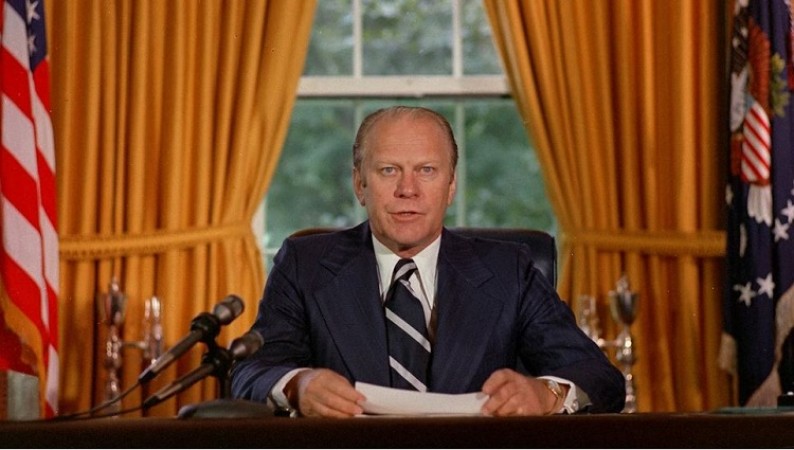
UNITED STATES: On September 8, 1974, The 38th US President Gerald Ford issued Proclamation 4311, a historic and highly controversial presidential proclamation that granted a full and unconditional pardon to his predecessor, Richard Nixon. This pivotal moment in American history marked the culmination of the Watergate scandal, which had shaken the nation and led to Richard Nixon's resignation as the 37th President of the United States. Ford's decision to pardon Nixon had far-reaching consequences and remains a subject of debate and scrutiny to this day.
The Watergate Scandal Unfolds
The Watergate scandal began in 1972 when five men were arrested for breaking into the Democratic National Committee headquarters at the Watergate complex in Washington, D.C. As investigations unfolded, it was revealed that the break-in was orchestrated by members of the Nixon administration and aimed at gathering information and conducting espionage on Nixon's political opponents.
Over the next two years, investigations by journalists and government officials exposed a web of corruption and abuse of power that went all the way to the highest levels of the Nixon administration. The scandal involved illegal wiretapping, secret slush funds, attempts to obstruct the FBI's investigation, and a cover-up that reached the Oval Office.
Pressure Mounts on Nixon
As evidence of wrongdoing piled up, the pressure on President Nixon to resign intensified. On July 27, 1974, the House Judiciary Committee passed articles of impeachment against him, charging him with obstruction of justice, abuse of power, and contempt of Congress. It became increasingly clear that Nixon's presidency was untenable, and he faced the very real prospect of being impeached and removed from office.
Nixon's Resignation
Amid mounting political and public pressure, President Richard Nixon made the dramatic announcement of his resignation on the evening of August 8, 1974. In an emotional address to the nation, he stated, "I shall resign the presidency effective at noon tomorrow."
With Nixon's resignation, Vice President Gerald Ford was sworn in as the 38th President of the United States on August 9, 1974. Ford faced a daunting challenge: to heal a nation deeply divided by the Watergate scandal and to restore trust in the presidency.
The Controversial Pardon
Just one month into his presidency, on September 8, 1974, Gerald Ford issued Proclamation 4311, granting Richard Nixon a full and unconditional pardon "for all offenses against the United States which he, Richard Nixon, has committed or may have committed or taken part in during the period from January 20, 1969, through August 9, 1974." This pardon meant that Nixon would not face criminal prosecution for any actions taken during his presidency.
Ford argued that the pardon was necessary to help the country move past the Watergate scandal and avoid a lengthy, divisive trial of a former president. He maintained that his decision was made in the best interests of the nation, as it would allow the government to focus on pressing issues rather than dwelling on the past.
Public Reaction and Political Fallout
Ford's pardon of Nixon was met with mixed reactions from the American public. Some believed it was a necessary step to promote national healing, while others saw it as an attempt to shield a disgraced president from accountability. Many Americans felt that Nixon should have faced the consequences of his actions in a court of law.
The pardon was deeply controversial and had political consequences for Ford as well. His approval ratings plummeted, and many in his own party criticized his decision. Some argued that the pardon was part of a prearranged deal between Ford and Nixon, although both men denied this.
Legacy and Historical Perspective
In the decades since Proclamation 4311 was issued, historians and legal scholars continue to debate the merits and motivations behind President Ford's decision. Some view it as a courageous act to move the country forward, while others see it as a missed opportunity to hold a president accountable for his actions.
The pardon of Richard Nixon remains one of the most debated and scrutinized presidential decisions in American history. It serves as a reminder of the delicate balance between accountability and national healing, and it highlights the complex ethical and political considerations that presidents must grapple with in times of crisis.
September 8, 1974, will forever be remembered as the day President Gerald Ford issued Proclamation 4311, extending a full and unconditional pardon to Richard Nixon. This historic act marked the conclusion of the Watergate scandal, but it also ignited a lasting debate about the role of presidential pardons, accountability, and the pursuit of justice in American democracy. Whether seen as an act of statesmanship or a betrayal of justice, Ford's decision remains a significant and controversial chapter in the annals of American history.